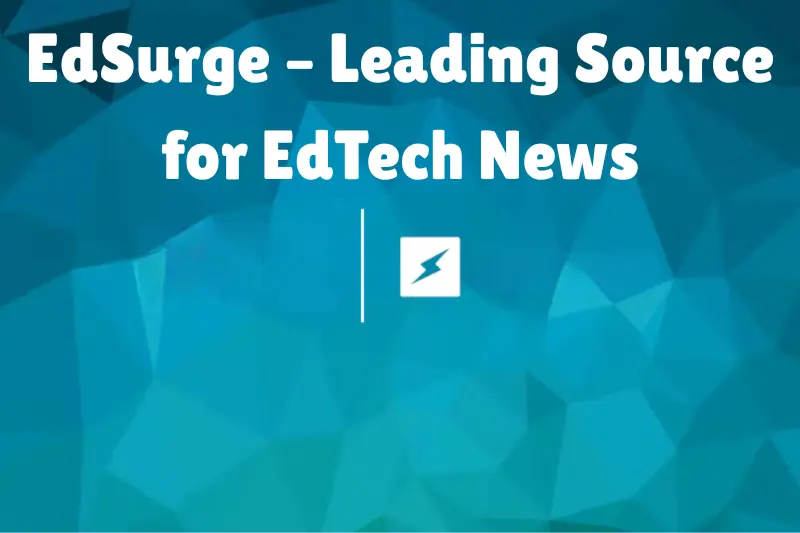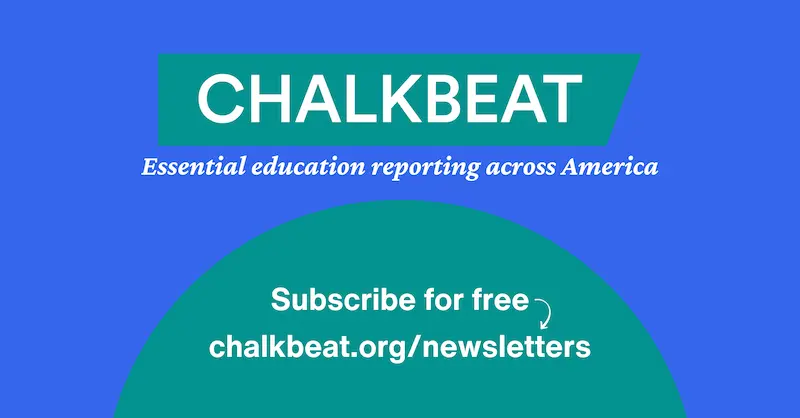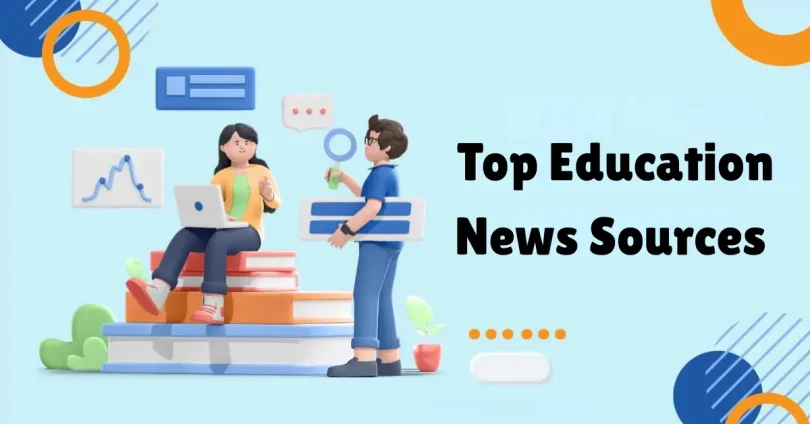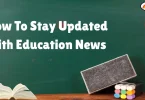In today’s fast-paced world, keeping up with education news is more important than ever. The education landscape is constantly changing—new policies are introduced, teaching methods evolve, technology transforms classrooms, and research breakthroughs appear almost daily.
Imagine a teacher like Sarah, who wants to use the latest digital tools to make her lessons more engaging. Or a parent like Raj, trying to understand changes in the school curriculum before the new academic year. Even students planning for college or policymakers shaping education initiatives need access to accurate and timely information.
Following the top education news sources can provide exactly that—reliable insights that help you make informed decisions, spot trends early, and stay ahead of challenges.
Here’s a detailed guide to the top education news sources that will help you stay informed, whether you’re teaching, studying, or managing education policies.
1. EdSurge – Leading Source for EdTech News

If you’re interested in how technology is transforming learning, EdSurge is a must-read. EdSurge specializes in education technology, offering news, reviews, and insights into the latest apps, platforms, and digital tools for classrooms.
EdSurge doesn’t just report trends—it also provides research-backed articles, case studies, and practical guidance for educators. For instance, if a school is considering a new digital learning platform, EdSurge can highlight success stories, potential pitfalls, and tips for implementation.
Why it’s important: Staying updated on EdTech helps teachers and institutions enhance learning experiences, adopt innovative solutions, and prepare students for a technology-driven world.
2. The Chronicle of Higher Education – In-Depth College Coverage
For anyone involved in higher education, The Chronicle of Higher Education is an essential resource. It offers comprehensive reporting on universities and colleges, covering faculty issues, research breakthroughs, institutional policies, and sector-wide trends.
From salary negotiations to campus diversity challenges, The Chronicle provides insights that help students, educators, and administrators make informed decisions. It’s also widely respected for its investigative reporting on critical issues affecting the academic world.
Why it’s important: Higher education is complex and rapidly changing. The Chronicle’s reporting equips readers with the knowledge they need to navigate this dynamic sector effectively.
3. University World News – Global Education Insights
If you’re interested in international perspectives on education, University World News is ideal. It reports on higher education trends from around the world, including policies, innovations, and research developments.
For example, it may cover how European universities are integrating AI into learning, or how Asian countries are expanding access to higher education. This global outlook allows educators and policymakers to learn from international best practices.
Why it’s important: Understanding global trends helps you anticipate changes at home and adopt practices that improve education locally.
You may also like to read this:
Study Tools Vs Traditional Notes: Best Method For Students
What Is Education News? Guide To Trends & Updates
10 Key Types of Updates In Education Transforming Classrooms
How To Stay Updated With Education News: Practical Guide
Why Education News Is Important: Connect, Learn, And Grow
4. The New York Times & The Washington Post – National Coverage
For broader education coverage alongside national news, The New York Times and The Washington Post are invaluable. These outlets report on policy debates, funding changes, equity issues, curriculum reforms, and the impact of societal trends on education.
They also provide in-depth features, analysis, and opinion pieces that help readers understand not just what is happening, but why it matters.
Why it’s important: Combining education news with broader reporting gives context, helping readers see how national and societal developments influence schools and universities.
5. Chalkbeat – Local Education Reporting

If you want to know what’s happening in your local schools, Chalkbeat is the go-to source. This nonprofit news organization focuses on K-12 education in specific communities, reporting on school district policies, student achievements, teacher initiatives, and community challenges.
Chalkbeat often uncovers stories that larger outlets miss, providing practical insights for parents, educators, and local policymakers.
Why it’s important: Local news affects communities directly, highlighting issues that impact day-to-day learning and offering actionable information for improving education locally.
6. Education Week – Broad and Practical Coverage
Education Week provides extensive coverage of K-12 and higher education. It combines news, research, and analysis to help educators, administrators, and policymakers implement best practices effectively.
Topics range from classroom innovations to policy analysis, funding issues, and teacher professional development. Education Week also publishes newsletters and special reports to help readers stay informed on specific areas of interest.
Why it’s important: It’s a reliable, comprehensive resource for national and state-level education news.
7. Inside Higher Ed – Higher Education Professionals’ Resource
Focused on higher education, Inside Higher Ed reports on faculty issues, curriculum trends, student services, and administrative updates. Its professional perspective makes it invaluable for academics, administrators, and anyone involved in college-level education.
Why it’s important: Timely insights from Inside Higher Ed help institutions improve practices and stay competitive in a changing educational environment.
How to Choose the Right Education News Source
Not every source fits every reader. Here’s a quick guide:
- Tech-focused educators: EdSurge
- College-focused readers: The Chronicle of Higher Education, Inside Higher Ed
- Global perspective: University World News
- Local updates: Chalkbeat
- National coverage: The New York Times, The Washington Post, Education Week
Selecting the right mix of sources ensures you get a comprehensive understanding of education from local classrooms to international trends.
Additional Tips for Making the Most of Top Education News Sources
Staying informed is not just about reading articles—it’s about actively using information to make decisions, improve practices, and anticipate trends. Here’s how you can maximize your use of the top education news sources:
1. Subscribe to Newsletters and Alerts
Most of the sources listed, including EdSurge, Education Week, and Chalkbeat, offer newsletters or alerts. By subscribing, you get the latest news delivered directly to your inbox, saving time and ensuring you never miss important updates.
Tip: Set up specific alerts for topics that matter most to you, such as EdTech trends, local school developments, or higher education policies.
2. Follow on Social Media
Many top education news sources maintain active social media profiles. Following them on platforms like Twitter, LinkedIn, or Facebook allows you to see breaking news, engage in discussions, and access additional resources such as videos, interviews, and infographics.
Tip: Create a dedicated education news feed or list to filter content from trusted sources, keeping your focus on high-quality information.
3. Join Professional Communities
Platforms like The Chronicle of Higher Education and Inside Higher Ed often have forums, webinars, and professional groups where readers can discuss articles, ask questions, and share insights. Engaging with these communities can deepen your understanding and provide real-world context to the news you read.
4. Compare Multiple Sources
No single source can cover every angle. By following a combination of local, national, and global sources—like Chalkbeat for local updates, The New York Times for national reporting, and University World News for global perspectives—you gain a well-rounded view of the education landscape.
Tip: Note differences in reporting styles or perspectives. Understanding multiple viewpoints helps you make informed, balanced decisions.
5. Archive and Reference Important Articles
As you read and learn, save important articles or create a personal database of resources. This can be particularly helpful for educators planning lessons, administrators shaping policies, or students conducting research.
Tip: Tools like Evernote, Notion, or even Google Drive can help you organize articles by topic, date, or relevance.
Why Staying Updated Matters
Education is more than textbooks and classrooms—it reflects broader societal changes, technological advancements, and evolving policies. Staying updated with the top education news sources helps you:
- Make informed decisions: Whether planning lessons, implementing policies, or choosing a school, current knowledge is key.
- Stay ahead of trends: Early awareness of new teaching methods, technologies, or regulations allows you to adapt before others.
- Enhance student outcomes: Teachers who stay informed can integrate the latest strategies and tools into learning experiences.
- Engage in meaningful discussions: Parents, educators, and policymakers can participate in informed debates and advocate effectively.
Final Thoughts
The world of education is dynamic, interconnected, and sometimes complex. By following the top education news sources, you equip yourself with the knowledge to navigate changes confidently, seize opportunities, and make a positive impact in learning environments.
Whether you rely on EdSurge for EdTech updates, The Chronicle of Higher Education for college insights, or Chalkbeat for local school developments, these sources provide reliable, actionable, and timely information. Combining them ensures a comprehensive understanding from local classrooms to international education trends.
In short, staying informed is not just about reading news—it’s about using knowledge to shape better education for yourself and the communities around you. With these trusted sources at your fingertips, you’ll always be prepared to act, adapt, and excel.
FAQs
1. What are the best sources for education news?
The best sources include EdSurge for educational technology, The Chronicle of Higher Education and Inside Higher Ed for higher education, University World News for global perspectives, Chalkbeat for local reporting, and The New York Times, The Washington Post, and Education Week for national coverage.
2. Why is it important to follow top education news sources?
Following reliable education news sources keeps you informed about policy changes, teaching trends, technological advancements, and research breakthroughs. It helps educators, students, parents, and policymakers make informed decisions.
3. Can I rely on social media for education news?
While social media can provide quick updates, it’s important to rely on credible sources like EdSurge, Chalkbeat, and The Chronicle of Higher Education for accurate, well-researched information. Social media should supplement, not replace, trusted news sources.
4. How can I stay updated on local education news?
Local-focused sources like Chalkbeat provide detailed reporting on school districts, policies, student achievements, and community initiatives. Subscribing to newsletters and following local education outlets is the best way to stay informed.
5. Are there international sources for education news?
Yes! University World News is an excellent source for global education trends, international policies, and innovations in higher education. It helps readers learn from practices around the world.




